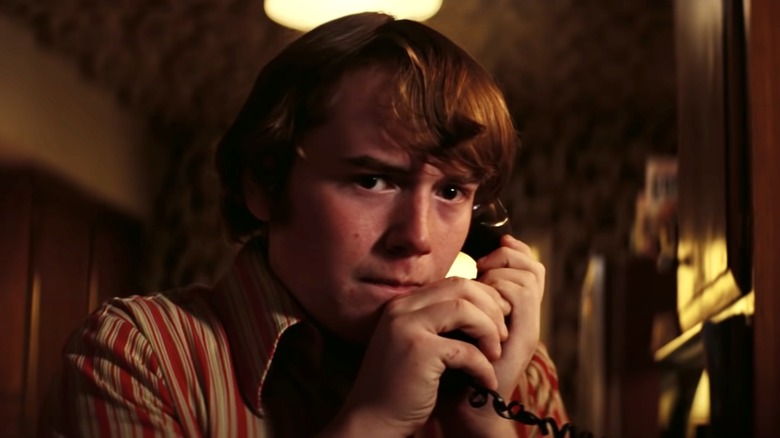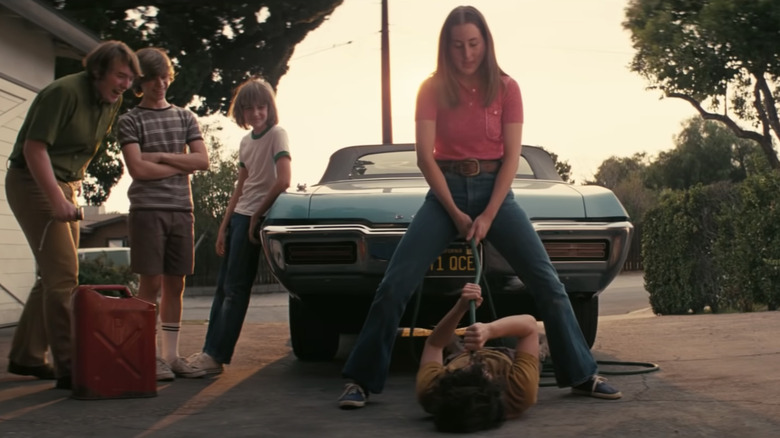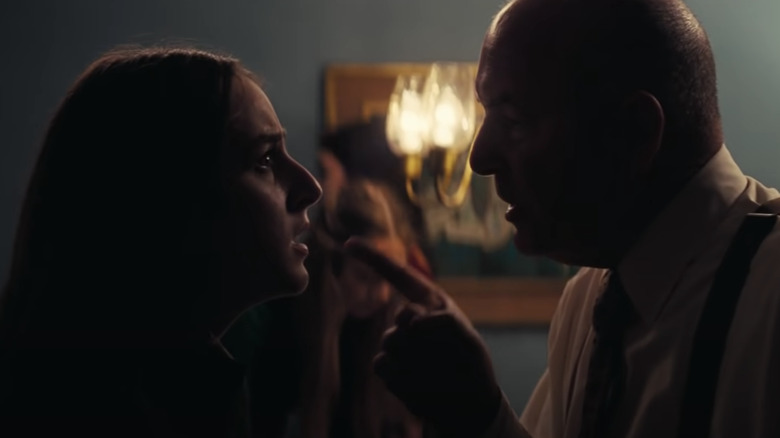Licorice Pizza Director Paul Thomas Anderson Responds To Criticism Of Fake Asian Accent
"Licorice Pizza" has received three Oscar nominations and a great deal of critical acclaim, but while expanding its theatrical rollout worldwide and making its rounds on the domestic awards circuit, it hasn't been all sunshine and rainbows for Paul Thomas Anderson's latest movie. Even if you haven't seen "Licorice Pizza" yet, you might have soaked up some of the discourse surrounding it on social media. In that amorphous place called Film Twitter, the movie has sparked a backlash due to one character, the restaurateur Jerry Frick (John Michael Higgins), who has interchangeable Japanese wives and who repeatedly imitates a stereotypical Japanese accent.
Now, Anderson has responded to the backlash in a new interview with IndieWire. When asked how he felt about the complaints over his "anti-Asian character," he said:
"It's kind of like, 'Huh?' I don't know if it's a 'Huh' with a dot dot dot. It's funny because it's hard for me to relate to. I don't know. I'm lost when it comes to that. To me, I'm not sure what they — you know, what is the problem? The problem is that he was an idiot saying stupid s**t? What do you think?"
When the interviewer tried to explain further what people are taking issue with — specifically, that the depiction of the character's racism could sanction some to laugh along with his sentiments rather than laughing at his ignorance — Anderson said:
"Right. Well, I don't know, maybe that's a possibility. I'm certainly capable of missing the mark, but on the other hand, I guess I'm not sure how to separate what my intentions were from how they landed."
Depiction does not equal condoning, necessarily, but the bigger overarching question is whether showing a character engage in outmoded stereotypes helps perpetuate those same harmful stereotypes and refuses to let them die. By his own admission, Anderson is "lost when it comes" to this kind of discourse and it's "hard for him to relate to" it.
Consider the real-world context
I'm a big Anderson fan, but as I've mentioned many times here on /Film, I also happen to live in Tokyo (where it's not wall-to-wall white kids, but rather wall-to-wall Japanese folks.) "Licorice Pizza" hasn't opened in Japan yet, so the cinephile and Japanophile in me can only sit by and watch with trepidation as this controversy plays out in the media. All I have to go on is what I've heard from stateside sources, including The Hollywood Reporter's detailed breakdown of the film's "Japanese wife scenes."
In the past, we've shared some of my own Japanese wife's thoughts on Sofia Coppola's "Lost in Translation," another well-regarded film that nonetheless has received criticism for its offhand treatment of the Japanese. Based on Anderson's comments, it seems like he couldn't even grasp where people were coming from when they questioned his platforming of biased humor through the mouthpiece of the Frick character (this, despite the fact that Anderson's own mother-in-law is Kimiko Kasai, an accomplished Japanese jazz singer). He even flat-out said: "What is the problem?"
That's a question that seems fairly ludicrous, given the real-world context of a country that has seen a meteoric rise in anti-Asian hate crimes during the pandemic. An NBC News report this week indicated that they were up 339 percent in the U.S. last year.
One notable reaction to "Licorice Pizza" that I did catch was that of former /Film contributor David Chen, the co-host of The Filmcast, who tweeted:
"Picture this: You're watching LICORICE PIZZA. It's brilliant. Then, early on, a buffoonish character drops an Asian caricature. The (mostly white) audience laughs. And now, you gotta think about that laughter the rest of the film. [...] LICORICE PIZZA is otherwise excellent. The dialogue is sharp. The cinematography is immaculate. I was so moved by the end. But the heartbreaking thing is me imagining an alternate version of this movie that didn't have this s**tty moment, which added virtually nothing to it."
Can we get off this train of depiction?
"Licorice Pizza" doesn't even have a Japanese release date (coincidence or conspiracy?), but I'll still watch it whenever it's possible for expats wedded to the U.S. iTunes store to do so. And I'm sure I'll probably like the movie, because I don't think Anderson's ever made a bad one. He's one of the four faces on my Mount Rushmore of modern filmmakers. But I'll shoot you straight, gentle reader: Reading his comments to IndieWire made my heart sink.
There's a part of me that is deeply disappointed to hear yet another respected, old-guard filmmaker who seems incapable of fully engaging with criticism of the racial content in his movies because he's still stuck in the 1970s. Anderson himself once wished "testicular cancer" on David Fincher "for all of his jokes about it" in "Fight Club." I don't wish cancer on anyone, but I do wish privileged Hollywood people — even the ones we like, like Anderson — would take a step back the next time they think it's funny to stick an Asian joke in one of their movies.
Yes, I do realize that every human is hypocritical to some degree. But the last time I watched Anderson's directorial debut, "Hard Eight," I remember also not being down with the whole scene where an old white man, played by Philip Baker Hall, takes it upon himself to shoot a Black man, played by Samuel L. Jackson. That, to me, seemed emblematic of a larger system of representation within the annals of American cinema.
Another example of that system is Jackson's frequent collaborator — and Anderson's friend and filmmaking contemporary — Quentin Tarantino, who endured his own Asian-representation controversy over the depiction of Bruce Lee in his latest film, "Once Upon a Time in Hollywood." Tarantino's films are also free-flowing in their use of the n-word, and he's never shown much contrition for it because he seems to feel entitled as an artist to write whatever he wants.
Contrast that with a film like Jeymes Samuel's "The Harder They Fall," where you're more likely to see a racist train conductor shot in the head before the n-word escapes their lips. Maybe filmmakers who are thinking about keeping the train going and having a regressive character air Asian stereotypes in their next movie should emulate "The Harder They Fall" rather than "Licorice Pizza."


